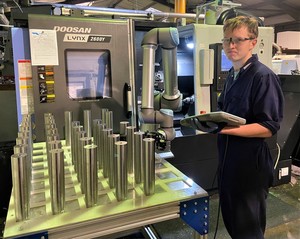

|
Edward Lowton
Editor |


|
| Home> | Plant, Process & Control | >Industry 4.0 | >Helping SME manufacturers make the most of cobots |
Helping SME manufacturers make the most of cobots
15 May 2023
While UK SMEs' move towards automation has been hampered by several barriers to adoption, things are changing for the better, says Will Kinghorn

UK INDUSTRY'S slow adoption of automation is no more evident than with small and medium sized manufacturers, where the barriers to adoption such as cost, complexity and talent pool are most keenly felt.
But things are changing for the better. Thanks to the reduced costs of the technology, unrelenting labour, supply chain and productivity challenges driving awareness of the need to accelerate adoption, and incentives such ‘super-deduction’, more and more SMEs are finding robotics accessible.
The Made Smarter adoption programme, a government initiative to help SMEs with their digital transformation journeys, is also playing its part.
Supporting digital transformation
One in five technology projects that the North West adoption programme has supported since 2019 are focussed on cobot, robotics and automation. Made Smarter has supported 60 businesses with £1.5m towards these projects that are worth £5.4m after private sector investment.
These manufacturers, who operate across all sectors, are experiencing the raft of benefits robot systems offer manufacturers including increased productivity and efficiency, more consistent and improved part production and quality, lower operating costs, reduced lead times, the ability to be more competitive, and improved worker safety.
Take GB Engineering, a manufacturer of precision components, based in Cheshire. Over the last 30 years it has evolved from a manufacturer of jigs, tools and fixtures for the automotive industry into a subcontractor for a multitude of sectors such as chemical, oil, military and medical.
Central to this evolution has been a willingness to combine a ‘can do’ engineering attitude and investment in technologies.
Rising prices, energy costs and supply chain issues, have been a challenge for GB Engineering, so it engaged with Made Smarter to create a digital roadmap and identify ways to become more efficient.
Automating manual loading and unloading
A priority was the need to automate the manual loading and unloading of CNC machines which was being done by its highly skilled team of engineers. The solution implemented is a UR10 cobot which will be used to load one of its CNC lathes.
Chosen for its versatility and capability to cope with large payloads and long reach, the technology is programmable which means it can be left unsupervised for hours at a time and relocated and repurposed to different machines to meet demand.
GB Engineering estimates that the cobot will automate 50% of the machine-tending tasks on that lathe and also enable unmanned overnight operation.
It is estimated it could increase capacity by up to 40 hours a week on that machine, the equivalent of one full time employee. On top of this, there is the additional productivity of the engineer moved to increased value tasks instead of loading.
The combined benefits will vastly improve manufacturing capacity and improve customer delivery times. Automation will also remove human error and improve consistency, reducing waste by five percent.
The investment is part of a broader plan by GB Engineering to develop a smart factory and encourage the next generation of engineers.
Owner Geoff Berrisford wants to create a workplace which embraces the latest technologies and is a launchpad to an exciting career.
The case for investing in robots
The ROI on the use of robots is startlingly clear. Enhanced product quality because of the precision machines offer, means there is a much lower chance of errors and mistakes, so you can guarantee the quality and consistency of output.
Along with faster production comes a long sought-after benefit: the ability to free human workers from the dangers and drudgery of manual work. Human workers can be elevated to roles where their individual skills and cognitive abilities can be better utilised.
Making better use of its workforce is a common benefit experienced by other Made Smarter-supported businesses.
Alleviating staff shortages
Agricultural machine manufacturer Storth, based in Cumbria, introduced a robotic welding system when it struggled to recruit skilled welders during the pandemic.
Its new cobot produces parts at twice the rate its human counterparts and welding staff have been moved to higher value, more rewarding and more technically challenging roles.
Ammunition manufacturer Empire Cartridges, based in Lancashire, had a similar experience. After investing in a six-axis cobot and process control technology it was able to increase manufacturing output of shotgun cartridge shells by 50%. The business also experienced increased quality control and upskilled its workforce from simple box fillers to cobot programmers.
These examples are also further evidence that cobots and automation are creating more jobs than they displace.
Creating new jobs
The 60 manufacturers adopting robotics through Made Smarter forecast their investments will collectively create more than 200 new jobs and upskill more than 300 existing roles, not to mention deliver an additional £45m in gross value added (GVA) for the North West region economy over the next three years.
These impressive figures are proof of the value that digital technology can bring to the manufacturing sector, but adoption needs to be done in the right way. This can be whittled down to four key areas: map your process to identify the best operation to automate, build the business case including specific requirements, speak to suppliers or integrators for proposals, and then select the option which best meets your requirements.
Made Smarter has developed a programme which helps manufacturers take those steps. We offer specialist, impartial technology advice, digital transformation workshops, leadership and broader skills development, and crucially, grant funding for projects. This holistic approach helps them select the right approach and the appropriate level of investment and tools for their business.
Four years on from its launch, Made Smarter continued to make a positive impact on manufacturers in the North West. And with programmes in the North East, Yorkshire and the Humber, the West Midlands, East Midlands, and West of England underway, more manufacturers are now accessing the support they need to digitalise, decarbonise and drive growth.
Will Kinghorn is robotics and automation specialist for the Made Smarter Adoption Programme in the North West
For more information:
- BEP Surface Technologies slashes energy use by 20% with data-driven project
- Relish the rise of the machines
- Stream Measurement unveils state-of-the-art digital gas calibration rig with support from Made Smarter
- Digital spare parts: innovation to solve supply chain woes
- Made Smarter powers SME manufacturers to invest £25m in technology
- Innovative leadership helping SME manufacturers take on toughest test
- Digital transformation confusion risks paralysing SME manufacturers
- Yorkshire manufacturers urged to "act now" to claim vital grant funding for technology
- Collaboration key to powering forward digital manufacturing
- Robotics and automation create manufacturing jobs
- Introducing Industry 4.0 to SMEs
- Enhance maintenance practices
- Digital transformation: Customer insight matters
- IoT digital experiments as a service
- Smarter maintenance: Paper available
- Condition monitoring & Industry 4.0
- Smart data collection
- Mechanised welding, cutting and Industry 4.0
- Tomorrow’s tech is here today
- The business value of Industry 4.0



















